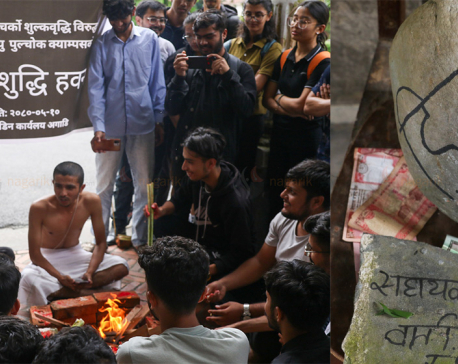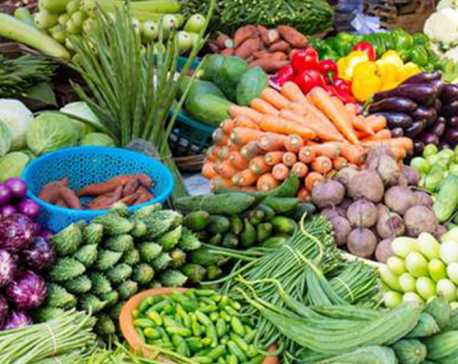
OR
Price rise of essentials blamed on weak monitoring
Published On: January 8, 2020 10:38 AM NPT By: Republica | @RepublicaNepal
KATHMANDU, Jan 8: Weak market inspection has once again given the unscrupulous traders leeway to profusely raise the price of essentials, as seen in the recent price hike of edibles by up to Rs 100 per kg.
According to retailers, price of black lentil (mas) and yellow lentil (mung) each has been dearer by Rs 20 a kg, while the prices of split pigeon pea (rahar) and red lentil (musuro) have gone up by Rs 10 per kg over the past fortnight. Likewise, prices of almost all types of edible oil have gone up by Rs 10 per kg. The price of wheat flour has also increased by Rs 5 per kg, while chili powder has become dearer by Rs 100 per kg over the past two weeks.
Retailers see the hand of distributors and importers behind hefty rise in the price of essentials which have made a big hole in consumer's pocket. “Stating that price of raw materials have increased in the international market, bulk sellers have been increasing the prices of edible commodities in the domestic market,” a retailer told Republica on condition of anonymity. “They have even stopped providing us invoice while purchasing goods,” the retailer said.
The rise in the prices of edibles has compounded woes for consumers who were already affected by the hike in prices of poultry products.
Raj Kumar Shrestha, president of the Nepal Retailers' Association, said the wheat flour wheat has become expensive by Rs 250-Rs 300 per 50 kg sack. According to him, the government's decision to impose value-added tax and the drop in local production of wheat has caused the price of wheat flour to spike.
Shrestha said that peas and gram are becoming expensive after traders started selling the imported products to India. “As these products fetch higher price in the Indian market, many traders have started exporting products imported for domestic consumption to India. This has created shortage in the market and caused the prices go to up," he added.
Quoting importers, Shrestha said pulses and edible oils have become expensive also due to the rise in the value of US dollar vis-à-vis Nepali currency. “Showing the depreciation of domestic currency against the greenback, both wholesalers and distributors have raised the prices of edibles,” he added.
According to the Nepal Rastra Bank, Nepali currency has become weaker by Rs 1.30 per dollar over past 10 days. “It is unfair that traders are raising the price of essential commodities even though rupee has weakened against dollar only marginally," Madhav Timilsina, president of Consumer Rights Investigation Forum, told Republica. “It is all due to the weakness of government authorities in market regulation.”
The Department of Commerce, Supply and Consumer Protection Management, the chief body for market regulation, however tried to save face by saying that the department has initiated dialogue with the concerned traders. “On Tuesday, the department called on the producers, wholesalers and retailers to furnish actual causes behind soaring prices,” Netra Prasad Subedi, director general at the department, said.
According to Subedi, the department has asked the wholesalers and importers to provide the details of stocks within a week. “We will also conduct spot inspections at warehouses of bulk sellers if needed," he added.
You May Like This

Pulchowk Campus students protest against fee hike by performing Hawan (In Photos)
KATHMANDU, Aug 27: Students of the Pulchowk Engineering Campus have taken a unique approach to protest against engineering fee hike... Read More...

Strengthen market monitoring
The recent surge in prices of essential vegetables, such as onions and potatoes, prior to the implementation of the proposed... Read More...

PM Deuba’s effigy burnt to protest against govt decision to hike prices of petroleum products
SINDHULI, Nov 12: Members of National Youth Federation Nepal and All Nepal National Free Students' Union (ANNFSU), Sindhuli Chapter burned... Read More...

Just In
- World Malaria Day: Foreign returnees more susceptible to the vector-borne disease
- MoEST seeks EC’s help in identifying teachers linked to political parties
- 70 community and national forests affected by fire in Parbat till Wednesday
- NEPSE loses 3.24 points, while daily turnover inclines to Rs 2.36 billion
- Pak Embassy awards scholarships to 180 Nepali students
- President Paudel approves mobilization of army personnel for by-elections security
- Bhajang and Ilam by-elections: 69 polling stations classified as ‘highly sensitive’
- Karnali CM Kandel secures vote of confidence


















Leave A Comment